- Home
- Jack Canfield
Chicken Soup for the Grandma's Soul Page 4
Chicken Soup for the Grandma's Soul Read online
Page 4
Love is all we have, the only way we can help the other.
Euripedes
The whole town called her Oohoo. Until the day she died peacefully in her sleep at the age of ninety-nine, many never knew her real name. I was the grandchild who coined the name when I was four or five. My mother would walk me the two blocks to my grandma’s house and help me climb the steep steps to her massive front door, which she always left unlocked. As Mom turned the knob and opened the door she would sing out, “Ooooooo hooooooooo.” Almost immediately, the beautiful, stately, white-haired lady with the big smile would come running down her staircase and scoop me into her arms.
I was a chubby, awkward, middle child, growing up in a small town in the 1950s where everybody knew everybody and all of their business. For some unknown reason, I experienced in my youth what too many kids are still experiencing today. If it hadn’t been for Oohoo and the safe haven of her loving home, I might have fallen through the cracks. By age ten I had learned to “stuff down my feelings and insecurities,” and by sixteen I was one hundred pounds overweight. But at Oohoo’s house I never felt judged. At school I was a well-known troublemaker who had been in and out of the principal’s office and suspended many times. But Oohoo loved me unconditionally and expected only the best from me.
My sister, Donna, was my hero and role model. She was four years older and had always been everything I wanted to be: head cheerleader, prom queen, valedictorian, yearbook queen, size eight. My younger brother, Duke, was just as admirable: star athlete, A+ student, Mr. Popularity. Then there was “Poor Debbie.” I heard that name applied to me so often that I lost count. Eventually I began drinking and smoking and trying anything I could sniff or swallow. The label “at-risk youth” had not yet been coined, but I could have been the poster child.
Oohoo kept her door unlocked for a crying ten-year-old when she was called “Fatso,” for a fifteen-year-old who wasn’t chosen for the cheerleading squad, for a seventeen-year-old who wrecked the car and was afraid to tell her parents, and for a twenty-one-year-old who didn’t want to live anymore.
My poor parents took me to counselors and doctors and were always trying to pull me out of my abyss. Upon the advice of a child psychologist, they agreed to let me stay with Oohoo temporarily. She never mentioned my weight, never condemned me and always treated me with respect and dignity. She was tough on curfew and following house rules, but she immersed me in love and became my role model.
Every Sunday from as early as I can remember, Oohoo picked me up for Sunday school. She taught there for seventy-eight years and practiced every word of what she preached. I never heard her say one unkind word about anyone; she was a friend to people of all backgrounds, cultures and races. Oohoo taught me the meaning of selfless giving, generosity and unconditional love. It is life’s tests that make us either bitter or better. Oohoo taught me to be better.
I didn’t know at that time about Oohoo’s own broken heart or her problems with my grandfather. Against all odds, my precious grandmother had graduated from the University of Missouri in 1919, and she inspired me to stay in school and go on to college as well. Her house was filled with poetry and literature from her own classes. Her old trunk was filled with costumes from her days in Hollywood when she boldly accepted a journalism assignment where young women then were not encouraged to go.
Oohoo had been a teacher and a journalist, and I became a teacher and a journalist too. Who would ever have thought I would be an English and drama teacher using some of the old books and costumes I carried from Oohoo’s house?
I am so grateful that Oohoo lived long enough to see me marry my college sweetheart, lose one hundred pounds, return to my family as a prodigal daughter and become Teacher of the Year. I got to tell her that she was my hero on the celebration of my grandparents’ sixty-fifth wedding anniversary.
She stayed with my grandfather when she had reason to leave, but he, too, turned around later in his life, realizing what a gem he had in Oohoo.
I began my career with an advantage because Oohoo taught me unconditional love and empathetic listening skills I would never have learned elsewhere. Having served now in the field of education for over thirty years, I can honestly say I believe most “problem children” could be turned around if they had a caring grandparent, an “Oohoo,” in their life. As high school and university instructors, we are told to call home at the first sign of any problem behavior, academic or otherwise. When my students’ parents aren’t home, or are too busy or just don’t know how to help, I have the alternative solution. Invariably there is a caring, knowing, loving person already waiting to help. All I need to do is ask, “May I speak to your grandmother?”
Debra D. Peppers
One Lonely Little Boy
You save an old man and you save a unit; but you save a boy, and you save a multiplication table.
“Gipsy” Smith
When I was twelve years old I was locked up in juvenile hall after being released from a Florida reform school. I refused to return to the Children’s Home Society where I was raised. I was never going back to that orphanage, even if I had to spend the rest of my life locked up in a small cage at juvenile hall.
I had been there for several months, and I had flatly refused even to walk out the front door to help them clean up the streets for fear they would take me back to that awful orphanage.
It was a Wednesday morning, and a man named Burt who worked for the court came into my cell and asked me if I wanted to go somewhere special for Thanksgiving dinner. I told him that I did not want to go outside of the juvenile shelter. I liked Burt because he was a nice man. Burt’s brother had written a song, which they played on the radio, called “The Lion Sleeps Tonight.”
Burt kept going on and on about Thanksgiving dinner and how a kid should not be locked up on Thanksgiving. So I finally told him that I would go.
The day before Thanksgiving, an older woman came to the shelter. She talked with me for about ten minutes. She told me that she wanted to take me to her house for Thanksgiving. She also said that no child should be locked up in a cage. Before we left I made her promise that she would bring me back the very next day.
Mrs. Usher and I walked out of the juvenile hall together and got into her car and drove to her house. As we walked in I was really surprised at what I saw. Her house was really small inside. Not like the big dormitory house that I had lived in at the orphanage—you could sleep thirty or forty people in our house at the orphanage. I was even more surprised when I went to their bathroom. I saw right away that they were not rich at all. They only had one toilet and one sink in their bathroom! They were really poor—and they did not even know it.
Of course, I had never been in a regular house before, and I did not know that regular people only had one toilet and one sink in their bathroom. That is one of the hazards of being raised in an orphanage—you never get to see what life is like in the real world. Then one day the orphanage shoves you out and everyone treats you like you are an idiot. They think you are stupid because you do not know anything about real life outside the orphanage.
Wednesday afternoon and evening were very difficult for me. I wanted so badly just to get out of there and go back to my cage at the juvenile hall. There must have been fifty people going in and out of that house, each doing this and that, all getting ready for that big Thanksgiving Day dinner the next day.
I was really scared, too. I didn’t like people very much. Especially grown people. They can do some really bad things to you when you are a kid. I hardly moved an inch because I was so scared. I never got out of my chair, nor did I move in any direction until almost all those people were gone late that afternoon. Mrs. Usher came into the living room and asked me if I wanted a bottle of Coke. I told her thank you, but that I did not care for anything. I wanted that Coke real, real bad, too. But I was just too scared to take it. I thought about that Coke all day long, and how good it would have tasted.
Late that night, when everyone was
asleep, I snuck into the kitchen real slow and quiet-like, and I took a cold Coca-Cola out of the refrigerator. I drank it real fast, in about five seconds, and then hid the bottle cap behind the refrigerator. After that I warmed the cold bottle against my stomach so it would be warm like the other bottles, then put it in the bottle carton so no one would ever know I drank it.
The next day was almost as unbearable for me as the first day, all because of the strange people coming for the big dinner. I would rather have died than to have gone through such a horrible experience as that dinner. All those big, strange people laughing and joking and making all kinds of noise. I had never been so embarrassed and so scared in all my life, and that is the God’s truth. Not scared like being scared of the dark—scared in a different kind of way. I cannot explain it, not even to myself.
I hardly ate anything that day, even though I had never seen so much food in all my life. I sure was glad when it was finally over.
Later that night, after everyone else had gone to bed, Mrs. Usher took me out onto her front porch and we talked for hours and hours. She was a real nice lady. I had never once just sat and talked with anyone in my whole life. It was my first “nice and slow time,” as she called it, and I really liked it.
I will never forget her kindness and her warm smile. But what I could not understand was why she was doing all of this for me. It was very difficult for me to understand why anyone would be kind to me. So I kept one eye on her all the time.
Mrs. Usher got up from her chair and went into the kitchen. She returned with a small bottle of Coke for each of us. She smiled and handed one to me. I will never forget that, either. That was the best Coke I ever drank in my whole entire life.
The next morning we ate breakfast together. Then she told me to go into the bedroom and get my things together so she could take me back to the juvenile hall, like she promised.
While I was in the bedroom packing I heard her in the hallway talking on the telephone to the authorities. She asked them why I was being sent back to the reform school. She wanted to know what I had done that was so bad that I had to be sent back there. They told her that I had done nothing wrong, but they had nowhere else to put me. I heard her get very mad at them and tell them that she was not going to bring me back to the juvenile hall to be “locked up again like an animal.”
God knows I loved that woman for saying that! That was the most wonderful thing anyone ever did for me as a child. That, of all the things in my life, was the one thing that made me want to become somebody someday. That one little sentence was the small and only light that guided my life for the next forty-five years.
I stayed there with Mrs. Usher for several weeks, and then I turned thirteen and left to go out on my own. I continued to see the Usher family on and off for the next twenty or thirty years, until their deaths. I know they wanted to adopt me. But when it was discussed I told Grandma Usher that it was too late for me. She placed her hands over her face and cried. I told her, “I have to make it on my own now, ’cause I’m a man.”
I just wish that I could have shown her how much I really loved her, but I did not know how to show love. I didn’t even know what love meant or what it felt like.
Grandma Usher is now in heaven. I hope she knows how much I love and respect her. I think she knows how much she added to the life of one lonely little boy that nobody else in the world wanted by teaching me “nice and slow time” . . . and love.
Roger Kiser
The Lincoln Zephyr at Midnight
I was only three years old when my world crumbled.
I knew my mother was sick, but I did not know how seriously ill she really was.
One day a big black car came to our house and took her away to a dark, stone hospital high on a hill several miles from home. It was a tuberculosis sanitarium. Daddy could go inside the building, but we children were not allowed to enter. I remember standing by the somber building and looking at a small window high above me. Grandma and Daddy would say, “There’s Mama; wave to Mama.”
I waved, but all I could see was the faint flutter of a small white hand in the window up there.
As time went by, my father and grandma decided it was too difficult to maintain our large home and family. So the household goods were stored in a relative’s barn, and my three brothers each went to a different sympathetic family member’s home to live. I stayed with Grandma. We traveled all over Iowa. We would stay in someone’s home for a few weeks, then Grandma would pack her small black satchel and stow my things in a pillowcase and we’d go someplace else for a while. Thankfully we had a lot of relatives and friends eager to help.
Daddy rented a room in the town near the hospital so he could be near his beloved Gracie. He got a part-time job driving a milk truck. I was bewildered and sad. I did not understand what had happened. Where were my parents? Where were my brothers? And where was my sweet little dog, Jiggs?
Through it all, Grandma was my savior. She comforted me as no one else could. One day we boarded a small train and rode one hundred miles to her son’s home by the Mississippi River. What a thrill it was to ride on a real train with Grandma beside me! My uncle met us at the depot and drove us in his Model A car to his farm a few miles away. We were happy there. I almost forgot about my real family . . . until around midnight every night.
There was a railroad track across the road from the farmhouse. I loved watching the trains roar by in the daytime. But in the dark of the night the mournful wail of the whistle on the sleek new Lincoln Zephyr would waken me as it sped down the tracks on its mighty trek from Chicago. As it faded away into the darkness, I remembered. . . . I was in a strange bed, in a strange house, and I didn’t know why my family wasn’t there.
But Grandma was. She would hold me in her arms and soothe me with her lovely voice until I drifted off to sleep once more, the sound of the whistle ringing in my ears.
After my mother recovered and our family was together again, Grandma lived with us until the end of her days.
She has been gone for over sixty years now, but to this day the sound of a train in the darkness takes me back to those lonely nights when I was three, and I still yearn for the comforting, warm arms of my grandmother.
Kathryn Kimzey Judkins
The Fabric of Love
Nothing is so contagious as example.
Francois Rochefoucauld
As a child, I memorized the months: May, June, July, Grandma. During the hottest days of summer, Grandma rode the train from Boston, bringing a suitcase of kosher food, her own special dishes, her sewing box and a bulging sack of remnants. She collected the cloth to create outfits for me.
While Grandma sewed, I fingered the hill of bright fabrics and made rows of her spools. In Russia, Grandma told me, she wore dingy brown so she blended in under the bed when she hid from the pogroms. She wanted me, her first granddaughter, to stand out.
Haloed by a bright floor lamp, Grandma’s thick glasses glinted as she pushed the needle in and out, each stab deliberate and focused. In Russia she had sewn near the dying fire, squinting in the dim light. When she came to America, Grandma sewed in a sweatshop lit by pale ceiling bulbs.
“Maybe I married your grandfather for the light,” she told me. “He promised we’d have enough money for lamps in every room.” My grandfather kept his promise: Grandmother’s house was fine and bright. She sewed her son sailor suits of thick navy wool and flossy white piping. She sewed her husband linen shirts. For herself, she made serious cotton shirtwaists that nipped her wrists and circled her throat.
I watched as she gathered turquoise cotton in a pleated quartet, then let it flow into the stream of thread. I swayed along with the rhythm of the gather and release, holding my breath to count how many folds the needle penetrated.
The year I was twelve, Grandma broke her hip and did not come to visit. I began junior high school wearing hand-me-downs, fabrics that had stretched and faded on my older cousin’s body, then sighed and adapted to me. I liked the quiet
anonymity of blouses and skirts, too big, yet vaguely resembling the other girls’ outfits.
Then Grandma sent me a box of clothes—dumpy flowered skirts that were for a baby-faced girl, not a teenager.
“Nobody wears these kinds of clothes,” I told my mother.
“You will wear them,” she informed me.
The day I wore my grandmother’s skirt, I sank into the back of my classrooms so no one would notice me. During English, I spilled ink on the cloth petunias. On my walk home, my hem got splattered with mud. During dinner, spaghetti sauce stained my lap. Gradually, I eased out of Grandma’s childish clothes and back into my bland disguise.
That summer, we drove to Boston to visit Grandma.
The brown houses were glued together with no patches of grass between them. Grandma’s apartment was at the bottom of a steep hill. When she answered the door, her eyes were clouded, her fingers curled.
But her hug was fierce and strong.
Piles of fabric adorned her apartment: a scrap of cerise silk here, a heap of lemony taffeta there. Her narrow bed was a pile of pink checked cottons, slinky purple rayons and sturdy burnt orange wools. Beside the small television, her sewing machine wore a frothy green net petticoat.
My mother looked inside the refrigerator. My father looked inside the medicine cabinet.
“Stay with your grandmother while we go to the store,” Mother told me. I followed my parents, wanting to go with them, but they closed the door behind them.
“Sit, darling,” Grandma said, patting the sofa. I perched on the worn brocade cushion and she brought me an ancient seafoam green dress from the hook on her bathroom door.
“Try this on,” she said. I turned my back before I slipped out of my cousin’s navy blue cotton jumper. Gingerly I slid the fragile dress over my head and felt it wrap me snugly.
“Ahh,” Grandma said, folding her good hand around the stiffened claw of her other hand. She motioned me to the bathroom to have a look.

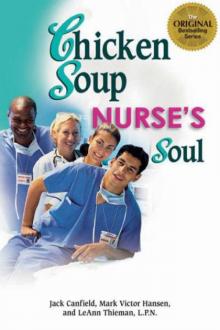 Chicken Soup for the Nurse's Soul: Second Dose
Chicken Soup for the Nurse's Soul: Second Dose Chicken Soup for the Ocean Lover's Soul
Chicken Soup for the Ocean Lover's Soul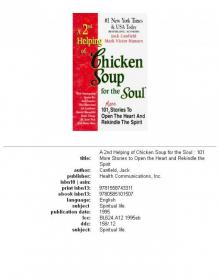 A 2nd Helping of Chicken Soup for the Soul
A 2nd Helping of Chicken Soup for the Soul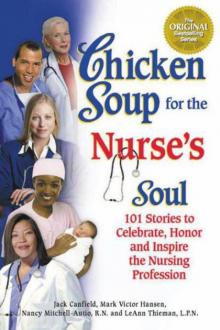 Chicken Soup for the Nurse's Soul
Chicken Soup for the Nurse's Soul Chicken Soup for the Breast Cancer Survivor's Soul
Chicken Soup for the Breast Cancer Survivor's Soul Chicken Soup for the Pet Lover's Soul
Chicken Soup for the Pet Lover's Soul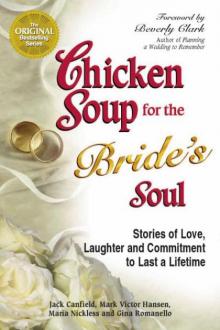 Chicken Soup for the Bride's Soul
Chicken Soup for the Bride's Soul A Chicken Soup for the Soul Christmas
A Chicken Soup for the Soul Christmas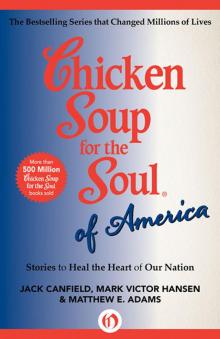 Chicken Soup for the Soul of America
Chicken Soup for the Soul of America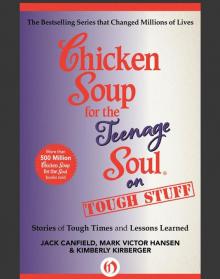 Chicken Soup for the Teenage Soul on Tough Stuff
Chicken Soup for the Teenage Soul on Tough Stuff A Taste of Chicken Soup for the Teenage Soul III
A Taste of Chicken Soup for the Teenage Soul III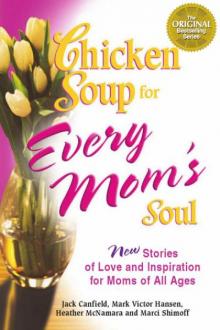 Chicken Soup for Every Mom's Soul
Chicken Soup for Every Mom's Soul Chicken Soup for the Dog Lover's Soul
Chicken Soup for the Dog Lover's Soul A Second Chicken Soup for the Woman's Soul
A Second Chicken Soup for the Woman's Soul Chicken Soup for the Soul the Book of Christmas Virtues
Chicken Soup for the Soul the Book of Christmas Virtues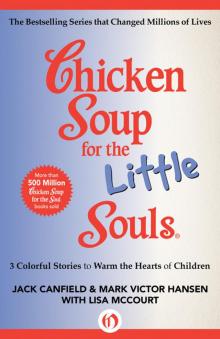 Chicken Soup for the Little Souls: 3 Colorful Stories to Warm the Hearts of Children
Chicken Soup for the Little Souls: 3 Colorful Stories to Warm the Hearts of Children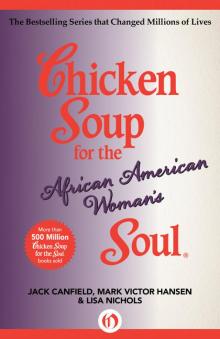 Chicken Soup for the African American Woman's Soul
Chicken Soup for the African American Woman's Soul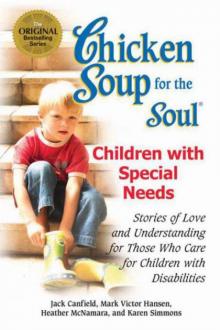 Chicken Soup for the Soul
Chicken Soup for the Soul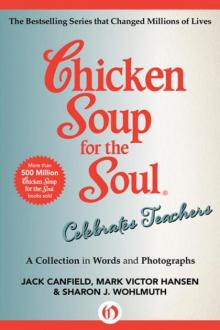 Chicken Soup for the Soul Celebrates Teachers
Chicken Soup for the Soul Celebrates Teachers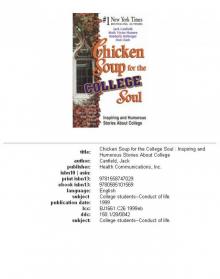 Chicken Soup for the College Soul
Chicken Soup for the College Soul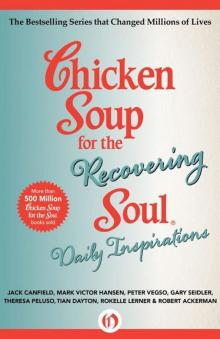 Chicken Soup for the Recovering Soul Daily Inspirations
Chicken Soup for the Recovering Soul Daily Inspirations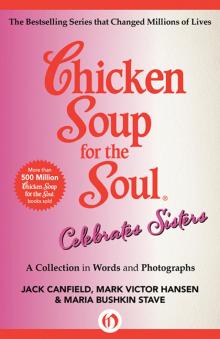 Chicken Soup for the Soul Celebrates Sisters
Chicken Soup for the Soul Celebrates Sisters Chicken Soup for the Dieter's Soul
Chicken Soup for the Dieter's Soul Chicken Soup for the Soul at Work 101 Stories of Courage
Chicken Soup for the Soul at Work 101 Stories of Courage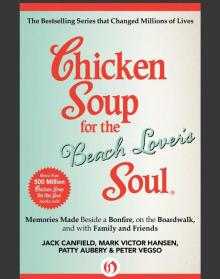 Chicken Soup for the Beach Lover's Soul
Chicken Soup for the Beach Lover's Soul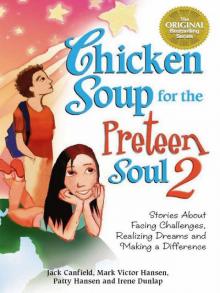 Stories About Facing Challenges, Realizing Dreams and Making a Difference
Stories About Facing Challenges, Realizing Dreams and Making a Difference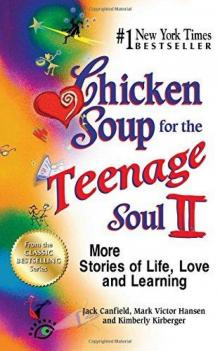 Chicken Soup for the Teenage Soul II
Chicken Soup for the Teenage Soul II Chicken Soup for the Girl's Soul
Chicken Soup for the Girl's Soul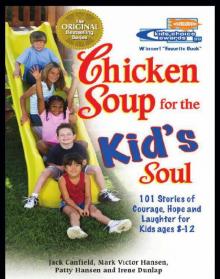 Chicken Soup for the Kid's Soul: 101 Stories of Courage, Hope and Laughter
Chicken Soup for the Kid's Soul: 101 Stories of Courage, Hope and Laughter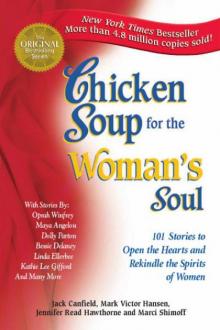 Chicken Soup for the Woman's Soul
Chicken Soup for the Woman's Soul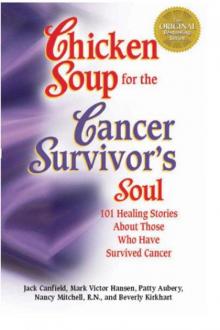 Chicken Soup for the Cancer Survivor's Soul
Chicken Soup for the Cancer Survivor's Soul Chicken Soup for the Canadian Soul
Chicken Soup for the Canadian Soul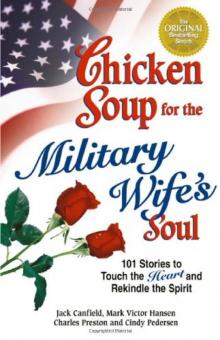 Chicken Soup for the Military Wife's Soul
Chicken Soup for the Military Wife's Soul A 4th Course of Chicken Soup for the Soul
A 4th Course of Chicken Soup for the Soul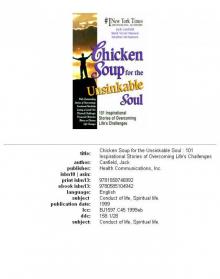 Chicken Soup Unsinkable Soul
Chicken Soup Unsinkable Soul Chicken Soup for the Soul: Christmas Magic
Chicken Soup for the Soul: Christmas Magic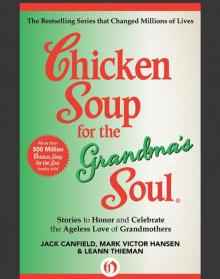 Chicken Soup for the Grandma's Soul
Chicken Soup for the Grandma's Soul Chicken Soup for the Soul: All Your Favorite Original Stories
Chicken Soup for the Soul: All Your Favorite Original Stories Chicken Soup for the Expectant Mother's Soul
Chicken Soup for the Expectant Mother's Soul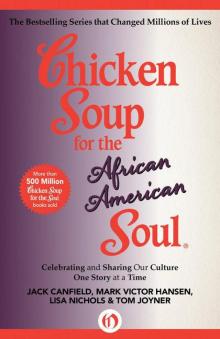 Chicken Soup for the African American Soul
Chicken Soup for the African American Soul 101 Stories of Changes, Choices and Growing Up for Kids Ages 9-13
101 Stories of Changes, Choices and Growing Up for Kids Ages 9-13 Christmas Magic
Christmas Magic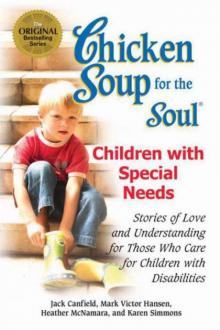 Chicken Soup for the Soul: Children with Special Needs
Chicken Soup for the Soul: Children with Special Needs Chicken Soup for the Soul: Country Music: The Inspirational Stories behind 101 of Your Favorite Country Songs
Chicken Soup for the Soul: Country Music: The Inspirational Stories behind 101 of Your Favorite Country Songs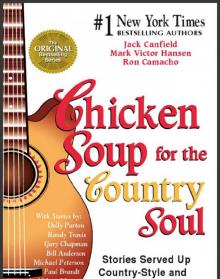 Chicken Soup for the Country Soul
Chicken Soup for the Country Soul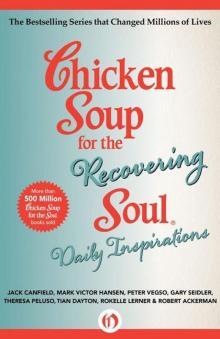 Chicken Soup for the Recovering Soul Daily Inspirations (Chicken Soup for the Soul)
Chicken Soup for the Recovering Soul Daily Inspirations (Chicken Soup for the Soul) A 3rd Serving of Chicken Soup for the Soul
A 3rd Serving of Chicken Soup for the Soul The Book of Christmas Virtues
The Book of Christmas Virtues Chicken Soup for the Soul at Work
Chicken Soup for the Soul at Work Chicken Soup for the Soul 20th Anniversary Edition
Chicken Soup for the Soul 20th Anniversary Edition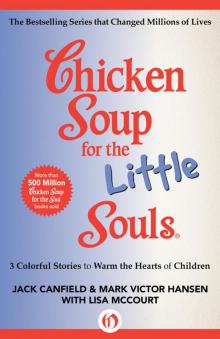 Chicken Soup for the Little Souls
Chicken Soup for the Little Souls Chicken Soup for the Soul: Reader's Choice 20th Anniversary Edition
Chicken Soup for the Soul: Reader's Choice 20th Anniversary Edition Chicken Soup for the Soul Christmas
Chicken Soup for the Soul Christmas Taste of Chicken Soup for the Teenage Soul III
Taste of Chicken Soup for the Teenage Soul III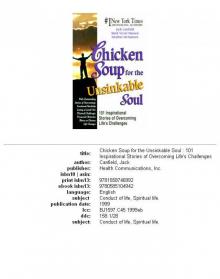 Chicken Soup for the Unsinkable Soul
Chicken Soup for the Unsinkable Soul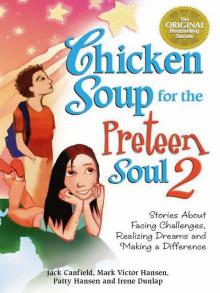 Chicken Soup for the Preteen Soul II
Chicken Soup for the Preteen Soul II